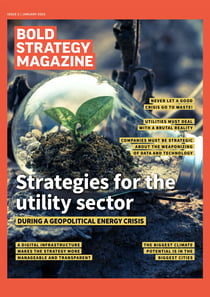5 Business Recommendations: how to come out a perfect storm stronger
.png)
The conference on utility strategies in a geopolitical crisis underlined that the sector faces many challenges and great uncertainty. But with stable processes of change, there are also many opportunities to emerge stronger on the other side of the crisis. The prerequisite is to get close to customers and move together on a good plan with the right benchmarks. You also need to be able to act quickly and engage the whole organization.
In the three or four months that passed between us considering initiating a conference on utilities' strategies in a geopolitical crisis and the conference itself, the agenda became, if possible, even more topical. COP27 took several decisions that, in addition to having a huge impact on the energy sector, will mean major investments in new technology and infrastructure, as well as compensation for countries affected by climate-related disasters. At the same time, the war in Ukraine entered a brutal new phase, with a determined drive to wipe out the energy and utility infrastructure.
It was a successful conference with interesting and informative presentations by committed and well-prepared speakers. Lars Goldschmidt's initial diagnosis of the situation of district heating companies hit the nail on the head: how utilities can deal with the historically big challenges of securing supply and stable prices without compromising the green agenda.
Business development, cybersecurity, and less CO2
Flemming Horn Nielsen from Lyngby Taarbæk Forsyning gave a fascinating insight into the development of a company (a craftsman's offer!) from lying down, to being able to crawl, to being able to walk, and to getting a grip on the strategic priorities. Gudrun Jónsdóttir talked about how Reykjavik Energy works systematically to achieve its strategic objectives in relation to owners, employees, the outside world, and the business itself.
Thomas Lund Sørensen and Morten Eeg Ejrnæs Nielsen each highlighted the impact of the geopolitical crisis on companies' cyber strategy and critical infrastructure protection. Are we ready to implement the necessary measures? And what does ‘being ready’ mean in concrete terms?
Tahirou Assane talked about what happens to corporate culture during crises, what organizations can do, and what new lessons can be learned. And finally, David Miller gave an interesting insight into the work being done to reduce carbon emissions in C40 cities if mayors come together and show leadership in the fight against climate change.
Navigating the high seas and uncharted waters
The challenges are many and the uncertainties are great. Utilities will be navigating high seas and uncharted waters for as long as we can see. However, there are also many opportunities to emerge stronger on the other side of what we might, without exaggeration, call "a perfect storm".
But the prerequisite for stable change processes in times of crisis is to have an organization with resilience. And how do you create that? Here are my top five business recommendations:
Recommendation #1: Get close to your customers (and your other stakeholders).
This recommendation, which I have borrowed from Steve Jobs, is not only relevant for technology companies, but also for utilities and municipalities. It's about getting really close to customers, citizens, and other stakeholders to understand their motivations and needs. Ideally, you should be able to tell them what they need long before they even recognize the need. Start by thinking about the three issues that most concern the energy or utility company's customers and other stakeholders right now.
Recommendation #2: Move together on a good plan
Find out where you are going and set a common course. Not everything can be equally important, so make sure you have your priorities straight. Designate those responsible for the initiatives that need to be carried out to make the plan a reality. And finally, give your plans an acid test or reality check. The biggest problem with many strategic plans is that they can't be implemented. Do we have the resources? Do we have a realistic view of what it will take? Is there sufficient support for the plan?
Recommendation #3: Find the right benchmarks
It's super important to find the right benchmarks for your strategy. They keep your organization on track and moving in the right direction. KPIs are quantifiable targets that provide a clear, real-time picture of performance at all organizational levels, so you can see if you're on track to meet your stated goals and objectives - and how far you are towards achieving them within the desired timeframe. KPIs are thus important navigation tools, especially during a crisis. But not all KPIs are equally good, and few are usually better than many. In times of crisis, it is best to focus on KPIs that are linked to driving business growth and bringing the organization closer to customers.
Recommendation #4: Be ready to react quickly
In times where the business environment is constantly changing due to external influences, it is important to be able to react quickly. If you sit on your thoughts for too long, your room for maneuvering is reduced, which can be fatal. Therefore, you need to be aware of internal and external changes and ensure that all strategic decisions are based on valid, real-time information. At the same time, it is essential that all those responsible have a clear mandate and can make decisions and act on their own within their area of responsibility. This can only be done when there is a common understanding and acceptance of the direction and clear lines of communication.
Recommendation #5: Engage the entire organization
Most managers - regardless of company size and industry - find it difficult to turn their strategies into reality. Studies show that three out of four strategies either fail or do not achieve their goals. One of the main reasons is that management underestimates what it takes to engage employees in achieving the individual initiatives that, taken together, determine success or failure. Albert Einstein said: nothing happens until something moves. This is not only a truth in physics but also when it comes to strategy.
The importance of creating an executive culture around strategy work cannot be overstated. It is not just about involvement and generating enthusiasm for a vision, understanding, and commitment to pursuing a goal. Every employee needs to know what to do to support the strategy.
Three out of four strategies fail
The fact that as many as three out of four strategies fail to achieve their goals or are never implemented is a relatively big problem. In financial terms, this means that $3 million is wasted every minute on failed strategies. If you are in the utility sector and invest large sums in strategic projects, there is a real risk that 75% of the investment will have no impact.
Therefore, it is worth considering and clarifying whether it is really under control. In my opinion, a company's strategy execution should be taken as seriously as its finances. One way to do this is to have a systematic approach and a digital infrastructure for strategy - just as you have a financial system for finance.
A Strategy for the strategy in Lyngby Taarbæk and Reykjavik
Lyngby Taarbæk Forsyning, which you can read about elsewhere in this magazine, is an example of a utility with this approach. With clear strategic priorities, it has pulled a declining utility out of the mire to a position where it has realistic ambitions to become Denmark's best. I admit that the systematic groundwork and culture change make all the difference - but there is also a supporting digital infrastructure, and it is provided by DecideAct.
Another example also featured in the magazine, is Reykjavik Energy. The Icelandic energy company was one of the first in the world to use a digital infrastructure for strategy implementation, monitoring, follow-up, and execution. They were involved from the very beginning of DecideAct, when we researched how to translate strategy plans in Excel sheets, PowerPoints, and Word documents into a digital platform. Today, DecideAct is a natural GPS for Reykjavik Energy's strategy work, with the entire organization committed to achieving its goals.
The two companies are, in my view, exemplary examples of utilities that have a strategy for their strategy, work systematically to achieve the objectives, and succeed in creating the necessary cultural change.
Although it might look like the world has been beaten from pillar to post in recent years and pressures on the energy and utility sectors have become uniquely hard, we can see from experts at the heart of riding crisis, managing change and forging a better, greener future, there has never been so much to learn to adopt and to adapt to forge that future.
Resilience is a word that crops up time and time again and is clearly a cornerstone of successful strategy and, therefore, successful business. The five business recommendations examples above will,when implemented into strategy, help develop resilience by engaging crucial processes and focal points.



.png?width=596&name=Cybersecurity%20(1).png)


.png?width=596&name=Strategy%20Development%20(1).png)



.png?width=80&name=USED%20(1).png)